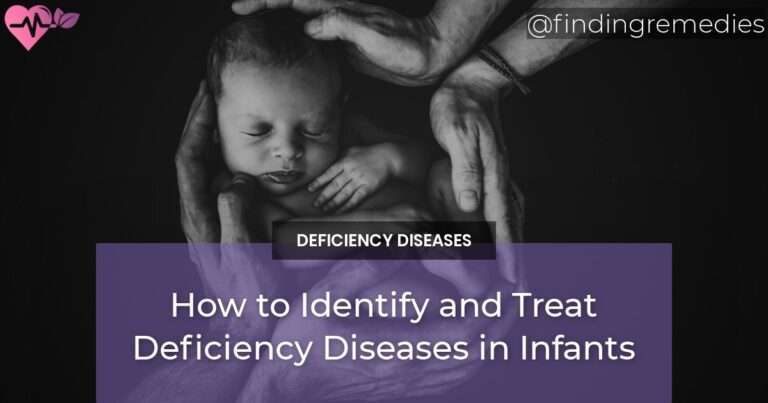As parents, we all want the best for our little ones. When it comes to their health and wellbeing, it’s important to have a basic understanding of what can go wrong and how to treat it. Deficiency diseases in infants can be difficult to identify and often require special attention and care.
In this article, we’ll explore the various types of deficiency diseases, how to recognize them in your child, and the best ways to treat them. We’ll discuss the importance of proper nutrition and supplement recommendations to help ensure you prevent deficiency diseases in infants and baby stays healthy.
Table of Contents
Importance of Identifying and Treating Deficiency Diseases in Infants
Deficiency diseases, also known as nutritional deficiencies, occur when the body lacks essential nutrients, such as vitamins and minerals, required for optimal growth and development. Infants are particularly susceptible to deficiency diseases due to their rapid growth and development. As such, it is crucial to identify and treat these diseases early to prevent potential long-term health consequences.
Common Deficiency Diseases in Infants
Iron-Deficiency Anemia
Iron-deficiency anemia is one of the most common deficiency diseases in infants. It occurs when there is a lack of iron in the body, which is essential for the production of red blood cells.
Causes
Iron-deficiency anemia can be caused by poor maternal nutrition during pregnancy and breastfeeding, and/or inadequate iron intake in infants.
Symptoms
Symptoms of iron-deficiency anemia in infants include pale skin, fatigue, irritability, and poor appetite.
Treatment and Prevention
Iron supplementation is the most common treatment for iron-deficiency anemia in infants. Additionally, a nutrient-rich diet that includes iron-rich foods such as meat, fish, and fortified cereals is crucial to prevent iron-deficiency anemia.
Vitamin D Deficiency
Vitamin D is crucial for bone growth and development in infants. A lack of vitamin D can lead to weakened bones and rickets.
Causes
Vitamin D deficiency can be caused by a lack of sunlight exposure, poor maternal nutrition during pregnancy and breastfeeding, and/or inadequate vitamin D intake in infants.
Symptoms
Symptoms of vitamin D deficiency in infants include delayed growth, soft skull bones, and muscle weakness.
Treatment and Prevention
Vitamin D supplementation and exposure to sunlight are the most common treatments for vitamin D deficiency in infants. Adequate maternal and infant nutrition is crucial for the prevention of vitamin D deficiency.
Risk Factors for Deficiency Diseases in Infants
Poor Maternal Nutrition During Pregnancy and Breastfeeding
A mother’s nutrition during pregnancy and breastfeeding can greatly affect the infant’s nutritional status. A lack of essential nutrients in the mother’s diet can result in deficiencies in the infant.
Preterm Birth
Preterm infants are at a higher risk of developing deficiency diseases due to their immature digestive systems, which can lead to poor nutrient absorption.
Exclusive Breastfeeding Beyond Six Months
While breastmilk is an excellent source of nutrition, it may not provide all the necessary nutrients for infants beyond six months of age.
Lack of Exposure to Sunlight
Infants who do not receive adequate sunlight exposure may be at risk of developing vitamin D deficiency.
Diagnosis of Deficiency Diseases in Infants
Physical Examination
A physical examination by a healthcare provider can help identify potential nutrient deficiencies in infants.
Blood Tests
Blood tests can confirm the presence of nutrient deficiencies in infants.
Imaging Tests
Imaging tests, such as X-rays, can help diagnose bone-related deficiency diseases.
Prevention of Deficiency Diseases in Infants
Adequate Maternal Nutrition
A well-nourished mother provides essential nutrients to her infant during pregnancy and breastfeeding.
Proper Infant Nutrition
A nutrient-rich diet for infants, including breastmilk or formula milk and nutrient-rich solid foods, can prevent nutrient deficiencies.
Sun Exposure
Adequate sunlight exposure can help prevent vitamin D deficiency in infants.
Treatment of Deficiency Diseases in Infants
Iron-Rich Foods
Iron-rich foods such as meat, fish, and fortified cereals can help prevent and treat iron-deficiency anemia in infants.
Sun Exposure
Adequate sunlight exposure can help prevent vitamin D deficiency in infants.
Vitamin D-Rich Foods
Vitamin D-rich foods such as fortified dairy products and fatty fish can help prevent and treat vitamin D deficiency in infants.
In conclusion, Deficiency diseases can have serious long-term health consequences in infants. Early identification and treatment of these diseases are crucial to prevent potential complications. Adequate maternal nutrition, proper infant nutrition, and sunlight exposure are essential in preventing deficiency diseases in infants. A nutrient-rich diet, dietary supplements, and follow-up care with a healthcare provider can help treat and prevent deficiency diseases in infants.

